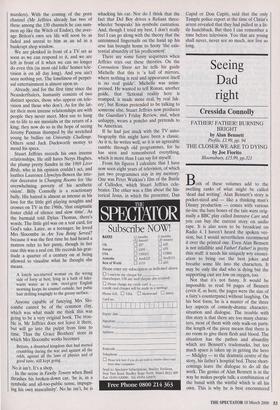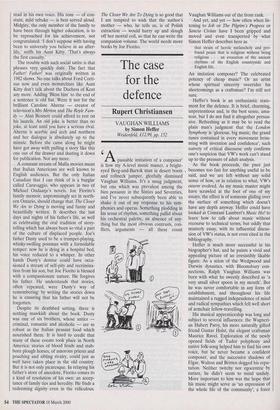Seeing Dad right
Cressida Connolly
FATHER! FATHER! BURNING BRIGHT by Alan Bennett Profile, £3.99, pp. 94 THE CLOSER WE ARE TO DYING by Joe Fiorito Bloomsbury, £15.99, pp.321 Both of these volumes add to the swelling ranks of what might be called `dead dad writing'. Alan Bennett's story is pocket-sized and — like a thinking man's Disney production — comes with various tie-ins: the bare bones of the tale were orig- inally a BBC play called Intensive Care and you can buy the current story on audio tape. It is also soon to be broadcast on Radio 4. I haven't heard the spoken ver- sion, but I would nevertheless recommend it over the printed one. Even Alan Bennett is not infallible and Father! Father! is pretty thin stuff: it needs his uniquely wry enunci- ation to bring out the best jokes and breathe some life into the characters. It may be only the dad who is dying but the supporting cast are low on oxygen, too.
Not that it's not funny. It would be impossible to read 94 pages of Bennett (even if, as here, the pages were the size of a fairy's counterpane) without laughing. On his best form, he is a master of the three key aspects of comedy-drama: character, situation and dialogue. The trouble with this story is that there are too many charac- ters, most of them with only walk-on parts: the length of the piece means that there is no room to give them flesh and blood. The situation has the pathos and absurdity which are Bennett's trademarks, but too much space is taken up in getting the hero — Midgley — to the dramatic centre of the story, his father's hospital bed. These short- comings leave the dialogue to do all the work. The genius of Alan Bennett is in the way he makes people talk; a combination of the banal with the wistful which is all his own. This is why he is best encountered read in his own voice. His tone — of con- stant, mild rebuke — is best served aloud. Midgley, the only member of the family to have been through higher education, is to be reproached for his achievement, not congratulated. 'I don't suppose with having been to university you believe in an after- life,' sniffs his Aunt Kitty. 'That's always the first casualty.'
The trouble with such social satire is that phrases very quickly date. The fact that Father! Father! was originally written in 1982 shows. No one talks about Ford Corti- nas now and even monarchists like Aunt Kitty don't talk about the Duchess of Kent any more. Adding 'Bless him' to the end of a sentence is old hat. Were it not for the brilliant Caroline Aherne — creator of television's Mrs Merton and The Royle Fam- ily — Alan Bennett could afford to rest on his laurels. An old joke is better than no joke, at least until you have a serious rival. Aherne is acerbic and arch and northern and her dialogue is absolutely up to the minute. Before she came along he might have got away with pulling a story like this one out of the drawer and dusting it down for publication. Not any more.
A constant stream of Mafia movies mean that Italian Americans are well known to English audiences. But the only Italian Canadian that I can think of is a burglar called Caravaggio, who appears in two of Michael Ondaatje's novels. Joe Fiorito's family memoir, unpromisingly set in north- ern Ontario, should change that. The Closer We Are to Dying is moving and funny and beautifully written. It describes the last days and nights of his father's life, as well as celebrating the oral tradition of story- telling which has always been so vital a part of the culture of displaced people. Joe's father Dusty used to be a trumpet-playing, whisky-swilling postman with a formidable temper: now he is dying in a hospital bed, his voice reduced to a whisper. In other hands Dusty's demise could have occa- sioned a stream of self-pity and recrimina- tion from his son, but Joe Fiorito is blessed with a compassionate nature. He forgives his father. He understands that stories, often repeated, were Dusty's way of remembering: by writing the stories down he is ensuring that his father will not be forgotten.
Despite its deathbed setting, there is nothing mawkish about the book. Dusty was one of six brothers, whose antics criminal, romantic and alcoholic — are as robust as the Italian peasant food which nourished them. It is hard to credit that many of these events took place in North America: stories of blood feuds and stub- born plough horses, of amorous priests and poaching and sibling rivalry, could just as well have taken place in the old country. But it is not only picaresque. In relaying his father's store of anecdote, Fiorito comes to a kind of resolution of his own: an accep- tance of family ties and heredity. He finds a redeeming dignity even in the ridiculous. The Closer We Are To Dying is so good that I am tempted to wish that the author's mother — who, he tells us, is of Polish extraction — would hurry up and slough off her mortal coil, so that he can write the companion volume. The world needs more books by Joe Fiorito.



















































































 Previous page
Previous page